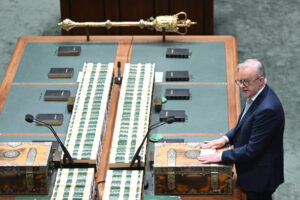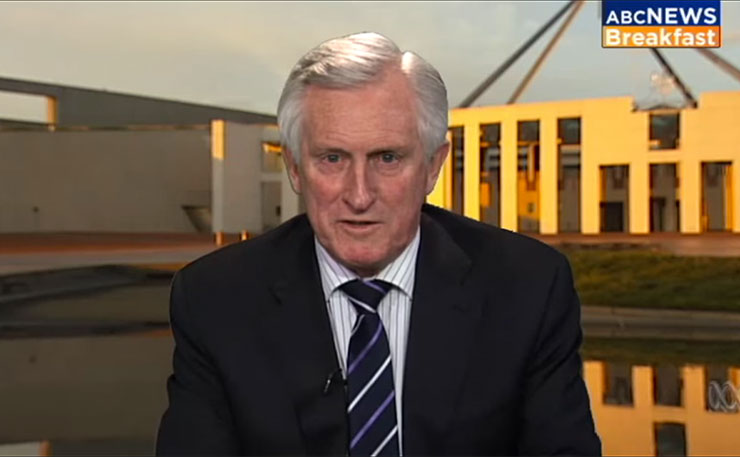
The first week of the 48th Parliament was very revealing.
Regular readers would know the question we have been asking is “what will Labor do with power?”. Now we have the answer.
The least possible.
Yes, to be fair it has only been a week in this Parliament and we are yet to see what the Albanese government’s version of “ambitious” ultimately ends up looking like, but we have been given the direction.
The very first bill the government introduced was legislation that will reduce HECS/HELP debt by 20 per cent. That is, as Ross Gittens of The Sydney Morning Herald pointed out, the very least they could do.
The bill helps those with university debt now, but does nothing to address the cost of going to university. It does nothing to correct the failure of the Morrison government Job-Ready Graduates program, which has seen minimal students choose to swap fields, but in some cases led the cost of university degrees to increase by 117 per cent.
Labor has been in power for more than three years. This is not a new problem and it has delivered what it said it would at the election – the least it could do.
This same week, Penny Wong signed a statement with 23 other countries and the UN calling for an immediate end to the slaughter of Palestinians in Gaza.
The language used in the statement was much less active, but it is the strongest to date. It is also, the very least Australia could do.
There is no action accompanying the statement, just the threat of unnamed actions if Israel does not allow for aid to flow. The only action was against Greens senator Mehreen Faruqi for the physic injury done to the Parliament after she held up a sign saying “Gaza is starving, Words won’t feed them, Sanction Israel” and shouted at Anthony Albanese as he left the Senate chamber.
Faruqi was formally chastised by the Senate – with Labor and the Coalition joining together – through a “displeasure” motion. Not for why she was protesting, oh no – but because it happened on the most sacred of days – the Parliament opening.
My goodness – the Governor-General was in the chamber! That’s almost the King! How could she?
Never mind that that very same day, Pauline Hanson’s One Nation senators turned their backs during the Acknowledgement of Country, allegedly on behalf of Australians who voted against the Voice.
That doesn’t deserve a formal chastising.
Not all disrespect is equal, it seems. Instead, Labor did the very least it could and voted against the Coalition attempt to have Faruqi suspended from the Senate until she apologised.
The same day the statement Australia signed was released, the names of 17,000 Palestinian children killed in Gaza by Israel were read out on the Parliament lawns in a non-stop vigil that went for 24 hours.
Ed Husic was the only Labor MP who participated. He was also the only Labor MP who attended a press conference with some independent and Greens MPs in accepting a petition to present to the Senate on behalf of Médecins Sans Frontières.
By Friday, France’s announcement that it was going to recognise the state of Palestine pushed Albanese to release a statement of his own, restating Australia’s commitment to the two-state solution. Again, the least Labor can do.
We also have the pincer movement Barnaby Joyce and Michael McCormack are engaged in to end David Littleproud’s leadership of the Nationals, while also gripping on to some sort of political relevance.
To be clear, the private members’ bill Joyce is putting up to end net zero doesn’t matter It has no material impact on Australian policy, zero chance of passing, and won’t win any more votes than the Nationals already hold. It. Doesn’t. Matter.
But Labor, looking at the political benefit, will let it run as long as possible. Labor will bring the bill on for debate just to have all those speeches on the record.
It’s the least it can do, in order to ensure the Coalition continues to dig its way to irrelevancy. But it also means that the little Labor is doing on serious climate policy – which in the scheme of things, is again, the least it can do, looks so much better by comparison.
After all, ask for more and you could get less – because you could have the Liberals in charge and that would be worse for everyone, or so goes the argument. So Labor can continue on its path of opening up new fossil fuel sites and allowing the gas industry to direct vast swathes of climate policy, because at least it believes in net zero.
We know it’s the least it can do because despite the International Court of Justice’s ruling that states do have an obligation to lower emissions and that big fossil fuel exporters (like Australia) can’t pretend their exports don’t matter, and despite Australia arguing against almost every point made by states like Vanuatu calling for more direct responsibility, Labor spun the case as a win.
“Australia was proud to join the Pacific in co-sponsoring this Vanuatu-led initiative and to participate in the proceedings last year,” a government spokesperson said. Which was the very least it could do.
Because in reality, Australia argued that states have no legal obligations on climate change beyond what it signed up for in international agreements like Paris.
In its submission to the ICJ, the Australian government claimed it held no historic responsibility for climate change and also rejected things like the application of existing international law – like the no-harm principle – to greenhouse gas emissions.
But we supported the UN resolution to seek the advisory opinion. And we welcomed it being handed down. So, the least we could do.
There are three years of Parliament to go in a world where we are at several tipping points. The very least Labor can do is not just recognise it but act. ( Amy Remeikis)




